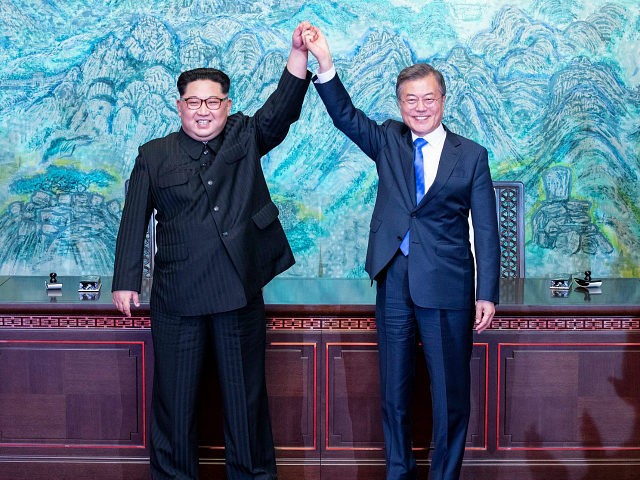Meeting in Japan for a summit between their three nations, South Korean President Moon Jae-in and Chinese Premier Li Keqiang agreed on Wednesday to pressure the United States into providing North Korea economic rewards for abiding by international law, if the Kim regime chooses to do so.
Moon Press Secretary Yoon Young-chan told reporters that Moon and Li – representing Communist Party leader Xi Jinping, who stayed home to meeting with dictator Kim Jong-un – “agreed that the international community, including the United States, must actively take part in ensuring a bright future for North Korea through a security guarantee and support for its economic development.”
They agreed to oppose pressure to get North Korea to “unconditionally denuclearize.”
Li added that he believes North Korea has yet to begin the denuclearization process in earnest because the regime “is waiting for corresponding feedback from the United States.” Kim is scheduled to meet President Donald Trump in late May or early June; Trump announced this week that a date had been set for the in-person encounter, but not yet revealed what it was.
China is North Korea’s closest ally and largest trade partner, and has repeatedly complained that international sanctions on Pyongyang hurt China more than any other country. Conversely, China likely has the most to benefit from those sanctions being repealed.
American “support for economic development” in North Korea appears to be a demand for not just sanctions relief, but direct investment of American money in rebuilding the tattered communist country.
North Korea, through its state media, made the case that the United States must call for sanctions relief because the sanctions had no effect. The idea that sanctions pressure brought North Korea to the negotiating table “is a sophistry that can be made only by those with the Cold War way of thinking and such rude remarks may reverse the situation in the peninsula,” the Korean Central News Agency (KCNA) argued on Wednesday. KCNA demanded “etiquette and sincerity” from Washington.
U.S. Secretary of State Mike Pompeo recently departed from Pyongyang, scheduled to arrive back in the United States after a meeting to plan logistics for the Kim-Trump summit at around 2 a.m. Thursday Eastern time, with the three known U.S. captives of the North Korean regime in tow. During his brief stay in Pyongyang, Pompeo vowed in the name of his country to aid in helping create a situation for “all the opportunities your people so richly deserve” to be available in North Korea. He also made clear that the Trump administration had no plans to remove sanctions before “we achieve our objectives.”
KCNA did not report on the visit and has yet to report on plans for Kim and Trump to meet in person.
The China, Japan, and South Korea talks were the first of their kind in three years and largely focused on supporting the North Korean denuclearization process. While China already enjoys an alliance with North Korea, and South Korea has made moves to normalize relations, Japan remains North Korea’s top target of threats and scorn. The Kim regime has repeatedly threatened Japan and largely refocused its vitriolic efforts in social media away from the United States and towards Japan. Japanese Prime Minister Shinzo Abe’s remarks about North Korea were thus significantly sterner than those of his counterparts.
“At the inter-Korean summit, Moon Jae-in exerted great efforts and I praise that,” Abe said. “Developments on the Korean peninsula are moving toward stability in Northeast Asia and complete denuclearization.”
Abe insisted on “firm actions” and promised “normalized ties” with North Korea only if the nation “walks toward the right path.” He did not join his counterparts in pressuring the United States to pay North Korea to move away from sanctions.
As North Korea’s closest ally, China has naturally been the most vocal country demanding the United States permit and contribute to an influx of cash to the Kim regime in exchange for North Korea abiding by international law like a responsible country.
“Quick nuclear abandonment by Pyongyang is certainly a welcome thing. But such a sharp change could take place only if the US offers Pyongyang attractive rewards,” the Global Times, one of China’s nationwide government newspapers, argued in April. The “attractive rewards,” which the newspaper did not specify, were necessary for Washington to build “strategic mutual trust” with Pyongyang.

COMMENTS
Please let us know if you're having issues with commenting.